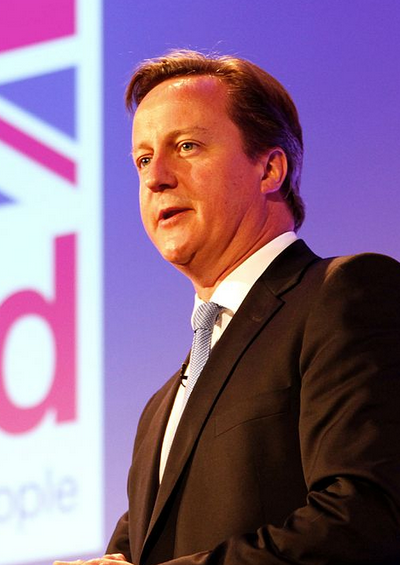Brexit Looming? Will Britain Leave the EU?
It would be a geo-economic-political moment without parallel in the democratic world since 1945.
May 5, 2015

The last major European nation to organize a referendum on withdrawing from an international treaty organization to which it belonged was Germany in November, 1933. Back then, 95% of Germans voted to quit the League of Nations. Although Hitler had arrived in power, German historians do not consider that voters were coerced as they cast their vote.
Now, the British Prime Minister, David Cameron, is hoping to retain power with a promise to hold a plebiscite by 2017. It would allow British citizens to vote to leave the European Union.
So far, the issue of Brexit – Britain exiting the EU – has barely surfaced as a major issue in the British general election that is now under way ahead of the poll on May 7.
An unprecedented event
But the world better take note: Compared to the minor sideshow of Greece and a possible Grexit, the idea that Britain would leave the EU will be a geo-economic-political moment without parallel in the democratic world since 1945.
The French extreme right populist, Marine Le Pen, says she will copy David Cameron and organize a referendum on “Frexit” – France leaving the EU, if she wins power in 2017.
Britain outside the EU would leave the United States without its closest partner and ally in Europe and further distance America from Europe.
Germany, already the EU hegemon, would become even more dominant without the counter-balancing weight of Britain. The latter has 12.5% of the total EU population and its fastest growing economy.
Also consider the fate of Ireland. The country would twist in the wind after Brexit. Today, the Irish and British form one economic space, even with Ireland using the Euro and Irish citizens having the right to live and work in Britain, as if they held British passports – dating from a 1949 law. An Ireland staying in the Eurozone as well as abiding by all EU laws would have to sharply recalibrate its legal relationship with Britain.
A Brexit vote would also accelerate Scotland’s departure from the United Kingdom. In any referendum, the Scots are likely to vote to stay in the EU. Meanwhile, the much more Euroskeptic English may be ready to say Bye-Bye.
Hesitancy in the private sector
The business community is divided. Big UK-based businesses with a global reach are horrified by Brexit. But they also dislike the idea of Ed Miliband as Prime Minister, especially if his majority in the House of Commons depends on the left-wing, statist Scottish Nationalist Party.
Business wants to keep Miliband in opposition and prefers to take the risk of a Brexit referendum under a second-term David Cameron administration.
Cameron himself says he can produce major reforms in Britain’s relationship with the EU sufficient to persuade the Euroskeptic Brits to vote Yes to Europe. That is a high ambition – especially because the very year of Mr. Cameron’s proposed referendum is 2017.
That is also the year of the German and French elections where both Chancellor Merkel and President Hollande face their own challenges from anti-European populism. It is very doubtful that making concessions to the UK is going to be part of their electoral formula.
Little wonder then that the Brexit question is being discussed with increasing intensity in foreign embassies. No ambassadors are going to express publicly the horror they have about two years of non-stop EU referendum campaigning, if David Cameron returns to No 10.
But one senior diplomat says the idea of a Brexit referendum swamping EU politics between 2015 and 2017 is “a nightmare in Berlin and Paris.”
Brexit an unlikely outcome?
So what are the chances of a Brexit vote? The recent British Social Attitudes Survey says that support for withdrawing from the EU is at its highest since 1985. Pro-EU pollsters take comfort from the fact that most polls show the stay-in-the-EU voters ahead of the get-out-of-the-EU supporters of Brexit.
But there is never a clear majority of over 50% saying yes to Europe. That is hardly a surprise, given the relentless growth of Euroskeptic views in UK politics, media and business so far this century.
Meanwhile, pro-Europeans tell each other that winning a referendum will be easy, as in the first ever referendum held in the UK in 1975 to ratify the House of Commons decision to join the European Economic Community, or more recently in Scotland. But they are wrong.
In 1975, Britain was barely in the then EEC, having joined in 1973. Every political party, all the press, including Rupert Murdoch, the Trade Union Congress (the umbrella organization of most unions in the country) and 99% of UK businesses were pro-European enthusiasts.
Even Margaret Thatcher, the newly elected Conservative leader, wrote an enthusiastic Europhile book “Britain in Europe” and campaigned in a sweater showing all the flags of the European Economic Community.
Europe then had a low-profile Brussels. It issued few directives, laid no claim to foreign policy and did not have a President or the Euro as a common currency.
In Britain, the main opponents of staying in Europe were the communist party, leftist nationalist Labour MPs and the syndicalist militant labor unions. Today, the forces aligned against Europe are far more powerful.
Remember as well that in Scotland, the September 2014 referendum was only won after a massive last minute bribe by London, as well as a promise of more power to seal the deal and maintain the 307-year-old English-Scottish marriage.
An EU rebate
There is no chance of the cash-strapped EU offering more money to London. In any event, there is no love in European capitals for the rebate.
The rebate is the cash that all other EU nations, including poorer new members, have to transfer to London under a deal negotiated by Margaret Thatcher 30 years ago when Britain was much poorer and got little benefit from European agricultural subsidies.
Today, Europe and Britain feels more like a 42-year-old cohabitation consisting of 27 partners where Brits – the 28th — live in a separate room quite apart from the continental EU nations.
The Brits feel they are bossed about by and pay too much to their partners, and now are annoyed at the arrival of more and more foreign and very poor relatives.
Let us remember as well that, beyond UK shores, every major referendum vote on Europe in other countries in the last 15 years said No to Europe – bar referendums on the EU Constitution in Europhile Spain and Luxembourg.
But the EU Constitution was voted down in France and the Netherlands in 2005, just as the Swedes voted No to the Euro in 2003. The assumption the British will be more pro-EU than other electorates is simply implausible.
The overwhelming odds thus are that different tributaries – political, economic, much of the press, cultural, identity, historic – are coming together into one powerful confluence that will take Britain out of Europe, if Mr. Cameron’s Brexit plebiscite takes place.
An alien state
In short, inside the UK, “Europe” – whatever its manifold merits — is presented as the latest in a long line of alien practices and beliefs, which do not mesh with British, or English, requirements and identity.
David Cameron believes he can negotiate a new deal for Britain to stay in a reformed EU. He has not yet spelled out his demands. But other senior Conservatives like the former Tory Prime Minister, Sir John Major, have said minimum requirements include Britain having control over European citizens coming to Britain or taking jobs.
However, the concept of free movement of people, along with free moment of goods, capital and services are the so-called “Four Freedoms” which lie at the heart of the EU’s very raison d’être. Chancellor Merkel, President Hollande and EU Commission President Juncker have all said that freedom of movement is non-negotiable.
Another demand, backed by business, is an end to Britain having to abide by the rules of so-called Social Europe, which acknowledge some role for trade unions and mandate core worker rights.
These demands for more worker representation present no problem to go-getting firms in Germany or the Netherlands or Poland, but are an obsession for British business leaders. Rather than acting in an inclusive, cooperative manner, they essentially show a class attitude by relentlessly decrying Brussels’ directives and social rules as holding back British business from profit and market success.
Complacency among Pro-Europeans
It goes without saying that there is little chance of the governments of Europe with social democratic or left-of-center parties in office tearing up “Social Europe,” just to appease a re-elected Cameron. That also very much applies to Angela Merkel’s Germany.
Conservative MPs have been campaigning on an increasingly Euroskeptic platform in elections since 1997. Even though the writing is clearly on the wall, the elite pro-European establishment in London pooh-poohs these fears.
These voices say Britain’s voters will never vote to put into practice the demands of UKIP, or of top Tories like London Mayor Boris Johnson, who says he sees no problem with Brexit and that Britain will flourish disconnected from Europe.
But this complacency, especially from business leaders — who privately express alarm at Brexit, but publicly refuse to challenge Cameron’s endorsement of Nigel Farage’s plebiscite — can easily come to bite back.
Britain may sleepwalk out of Europe contrary to the prime minister’s seemingly unshakable belief that it will be an easy task for him to obtain a new treaty, along with an end to free movement of people, a new social opt-out and other demands advanced by Euroskeptic forces.
The writing is already on the wall. After all, Cameron’s key aide, the cabinet minister Oliver Letwin, said in November 2014 that that if Cameron failed to gain a better deal for Britain in Europe, he “would want to recommend leaving.”
In short, Brexit is coming — but it may too late to stop it if Cameron stays in Downing Street.
Editor’s note: This feature was adapted from Denis MacShane’s latest book, “Brexit: How Britain Will Leave Europe” (I. B. Tauris, March 2015).
Takeaways
Britain leaving the EU will be a geo-economic-political moment without parallel in the democratic world since 1945.
Britain outside the EU would leave the US without its closest partner and ally in Europe.
Big UK-based businesses with a global reach are horrified by Brexit.
Pro-Europeans tell each other that winning a referendum will be easy. But they are wrong.
The assumption the British will be more pro-EU than other electorates is simply implausible.
Brexit is coming -- it may too late to stop it if Cameron stays in Downing Street.
Read previous

Global Racism
Obama’s Haunting Legacy
May 4, 2015
